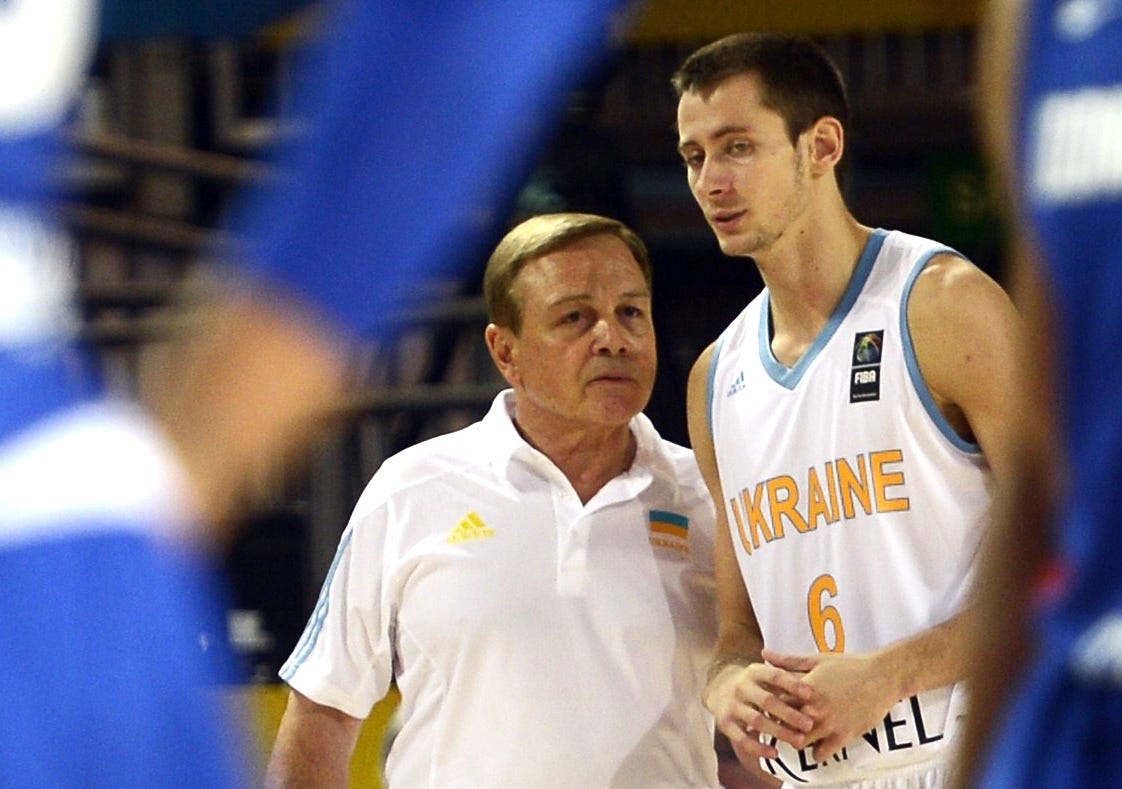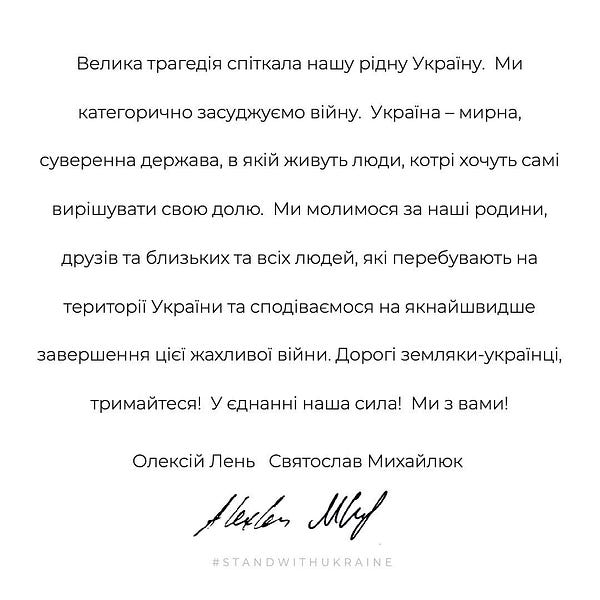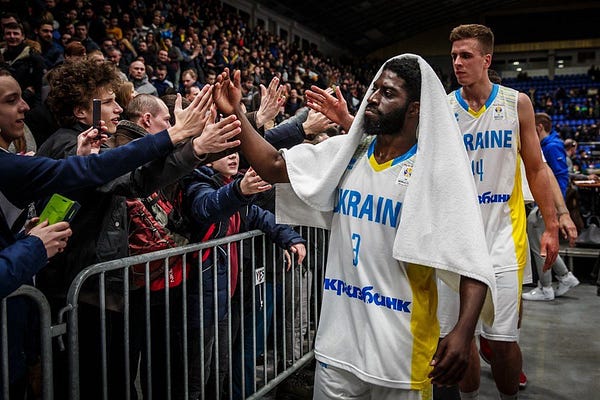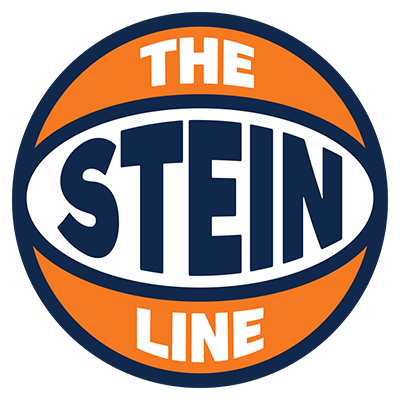Ukrainian by way of New Jersey
Mike Fratello's ties to the former Soviet republic now under Russian attack stretch back to his days as Alexander Volkov's first NBA coach in the 1980s. They only got deeper from there
You know him as Czar of the Telestrator, as Marv Albert famously dubbed him, or maybe as the last coach to take the Cleveland Cavaliers to the playoffs, way back in 1998, without the luxury of building his team around LeBron James.
You could also refer to Mike Fratello as the NBA fixture whose four-plus decades in the league have almost always featured a connection to Ukraine and Ukrainians — long before the country now under siege had secured its independence from the Soviet Union.
Fratello was the coach of the Atlanta Hawks in 1986 when they selected a Ukrainian named Alexander Volkov out of the Soviet Union in the sixth round of the draft. Volkov's time as a Hawk was short — Sasha, as he is known, made it into only 149 NBA games over the course of three seasons — but the friendship they formed led to Fratello spending four summers from 2011 through 2014 as the head coach of Ukraine's national team.
It's a bond that has made Fratello, now 75, as Ukrainian as a New Jersey-reared coaching lifer could be.
"I have such close, close relationships with so many people there," Fratello said in a phone interview. "Sasha is on my mind every day. I am worried for the whole country every day."
At the direction of Vladimir Putin, Russian military forces invaded Ukraine on Feb. 24. In the two weeks since, for Fratello and anyone else connected to the region, it has been difficult to think of anything beyond what has been described as the most significant ground-level war in Europe since World War II.
The gravity of the situation might be best conveyed to basketball fans by the enclosed picture of Volkov, now 57, that circulated this week via social media.


When he is not working in his current broadcast roles with the Cleveland Cavaliers and LA Clippers, Fratello is spending much of his days tracking events in Ukraine while maintaining as much contact as he can with Volkov, Volkov’s family and other associates inside and outside Ukraine from his years coaching the national team, which culminated with Ukraine's qualification for the FIBA World Cup in Spain in 2014 — its first major tournament reached as an independent nation.
Among them is the former Los Angeles Laker Slava Medvedenko, who worked on Fratello's coaching staff, and Toronto's Svi Mykhailiuk. One of two Ukrainians playing in today's NBA alongside Sacramento's Alex Len, Mykhailiuk got his first major minutes on the international stage under Fratello when he was still a teenager.
As president of Ukraine's basketball federation, which came with a role in the country's parliament, Volkov successfully lobbied Fratello to take over a fledgling program that didn't play its first game under a Ukrainian flag until May 1993.
"When he called me, he actually called Kim Bohuny from the NBA first," Fratello said. "He called Kim and asked: 'Do you think Mike would consider coaching our team? Can you help me?'
"He was uncomfortable asking me that, but Kim said: 'Why are you even calling me? You know Mike loves you.' "
I saw it firsthand in 1989 on my very first NBA assignment. I was still in college at Cal State Fullerton, covering the Los Angeles summer league at Loyola Marymount for The Orange County Register, when Volkov joined the Lakers' Vlade Divac and San Antonio's Žarko Paspalj in the first wave of stars from Eastern Europe to receive clearance from their communist countries to play in the NBA.
Last year, after his tragic death in a bicycle accident, I shared the story of how the 7-foot-4 Mark Eaton of the Utah Jazz was the first NBA player I ever interviewed at that summer league as a trembling 20-year-old. Fratello was the first NBA coach I ever interviewed ... and I will never forget the interaction. Volkov was playing for the Hawks’ summer league entry at LMU and I had lodged a request with the team to speak to the coach.
I can still picture my nervy introduction to Fratello, when I looked about 14, and he quickly eased my apprehension with three words: "You need me?"
The 1980s Hawks were ahead of their time in terms of pursuing international talent, backed by owner Ted Turner’s status as a huge admirer of the Soviets, staunch backer of perestroika and ally of Mikhail Gorbachev’s government. Fratello credited New York-based scout Rich Kaner for keeping a front office helmed by Stan Kasten, now president and part-owner of the Los Angeles Dodgers, abreast of players Atlanta should be targeting in the days when the draft stretched well beyond two rounds.

In 1985, Atlanta selected Arvydas Sabonis with the 77th overall pick. The Hawks argued that they should retain Sabonis' rights until he chose to come to the NBA, but the pick was voided because Sabonis, amid much debate about his actual age, had not yet turned 21. In the 1986 draft, Portland selected Sabonis with a first-round pick (No. 24 overall) ... even after Sabonis had sustained a devastating Achilles tear. The Trail Blazers waited almost a decade, until the 1995-96 season, for Sabonis to finally consent to leaving the comforts of Europe and his status as the greatest player outside of the NBA to come to the world's best league.
"We went nuts," said Fratello, who is still prone to lapse into what-if contemplations about the prospect of pairing Sabonis with an in-his-prime Dominique Wilkins and the damage they might have done. "Stan made a big thing out of it."
Nothing, though, could derail Fratello's lifelong association with Volkov, even though the 6-foot-10 forward couldn’t establish himself in the NBA as firmly as Šarūnas Marčiulionis and Sabonis, his teammates on the unified Soviet squad that won gold at the 1988 Olympics in Seoul, ultimately did.
During his four-year run as Ukraine's coach, Fratello spent three-month summers there, often living in a hotel not far from the country's Independence Square in Kyiv. He brought a slew of American coaches with him — Bob Hill, Jay Larranaga, Joe Wolf, Jack Nolan, Eric Glass and former Villanova star Ed Pinckney — and eventually put the ball in the hands of a Los Angeles point guard who gained Ukrainian citizenship: Pooh Jeter.
Yet during the last year of that stint, as Ukraine was preparing for the hoopla of the 2014 Worlds and a game against the United States in Bilbao, Russian forces seized the Crimean Peninsula. It was Fratello's first glimpse of what has morphed into a deadly conflict that appears on every news channel now.
“To watch what's going on, lives are being lost and that is obviously the No. 1 concern," Fratello said. "And then there is the destruction of these beautiful cities and the country of Ukraine.
“In the years I was there, Kyiv felt like a miniature New York. It had these great structures and it had restaurants, shopping, anything you could want. The hustling, bustling city of Kyiv — they had all of that going on.
"Then in the fourth year, that's when it all changed. The Russians came in and started taking over Crimea and people started losing their lives. That last year, when we went to the world championships, it wasn't the same.
"How do you rebuild the history? It was majestic when you'd be there and you'd see these domed structures and hear the stories behind them and what they meant to the people there. How do you put that all back into place?"

The Stein Line is a reader-supported newsletter, with both free and paid subscriptions available, and those who opt for the paid edition are taking an active role in the reporting by providing vital assistance to bolster my independent coverage of the league. Feel free to forward this post to family and friends interested in the NBA and please consider becoming a paid subscriber to have full access to all of my posts.
Also: You can now read The Stein Line in the new Substack app for iPhones.
With the app, you’ll have a dedicated Inbox for my Substack and any others you subscribe to. New posts will never get lost in your email filters or stuck in spam. Longer posts will never be cut off by your email app. Comments and rich media will all work seamlessly. Overall it’s a big upgrade to the reading experience.
The Substack app is currently available for iOS. If you don’t have an Apple device, you can join the Android waitlist here.













Great stuff, Marc. I've been wondering about The Czar since Ukraine was invaded and this cleared up a lot of questions.
The one time I've been to Europe happened to coincide with the 2013 EuroBasket in Slovenia, a pilgrimage I'm eternally grateful for. As I was cheering on Marquette alum Travis Diener (playing for Italy) an older guy in a Ukrainian team polo turned and asked what my story was in a surprising American accent. We struck up a conversation and he took out his phone to show me some great videos of the raucous crowds from an earlier round of the tournament in the northern city of Jesenice. I want to say he worked for the Clippers at the time but I can't remember his name. Since that day I've been following and pulling for the Ukrainian team.
Dictators like Putin (and other authoritarians) can't stand it when a vibrant society is too close to their surveillance (police) state. It shows what frauds they are when their people are so close to that life but aren't allowed to live it ... and they KNOW it.